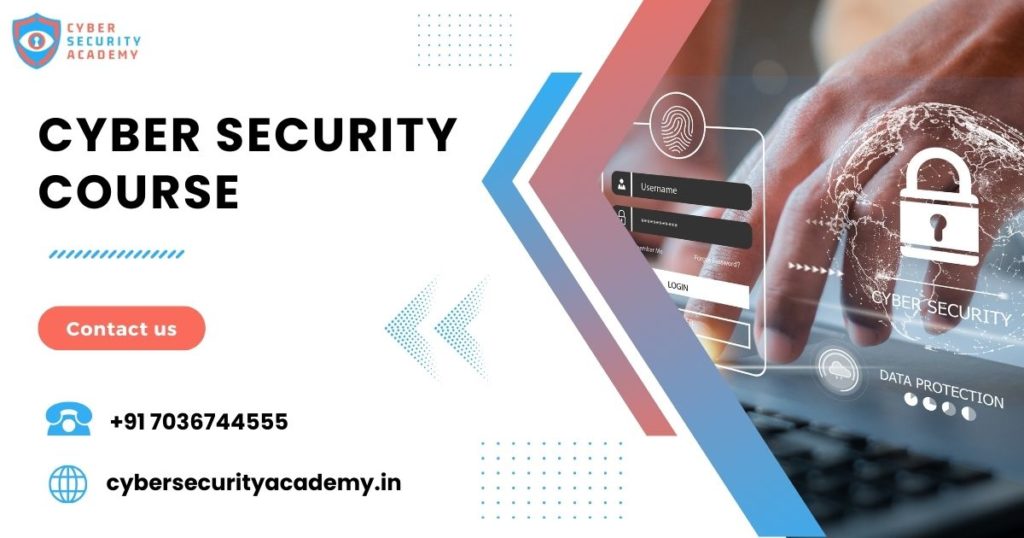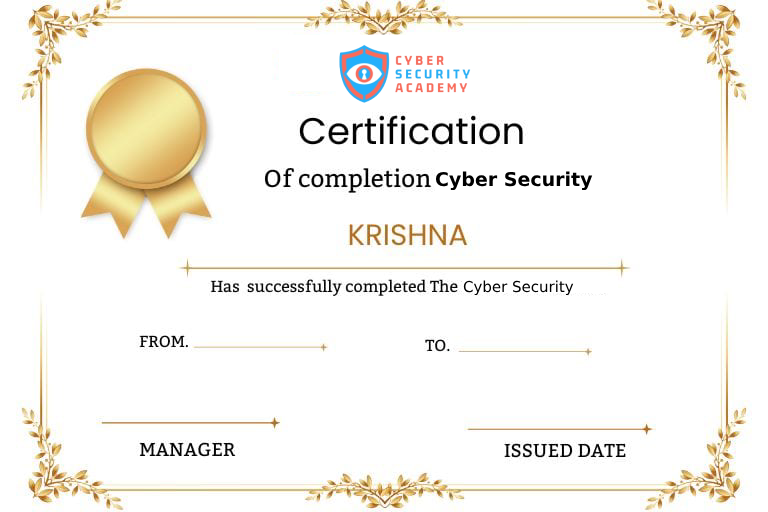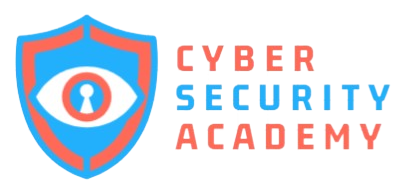Cyber Security Course in Hyderabad
- 100% Placement Guarantee available for selected candidates
- Offline Training With Practical Guidance
- 3 Months Training + 2 -3 Months Placement Program
- Resume Preparation Guidance + Interview Questions + Mock Interviews
- Expert trainers with 10+ Years of industry experience


3.5 K+
Happy Students
30 +
Video Ready Materials
50 +
Real Projects Finished
Table of Contents
ToggleNext batch Details
Cyber Security Course In Hyderabad
Course Topics
Introduction to Cyber Security
● Introduction to Cyber Security Roles and Responsibilities.
● Careers in Cyber Security Basic
● terminologies Elements of Information Security(CIA-Triad), Non-repudiation, Authenticity
Motives, Goals, and objectives of Information
● Security Attacks Types of Hackers
● Information Security Threat Categories.
● Cyber Kill Chain Penetration Testing and Methodologies (PTES standard, Red teaming,
Blue teaming)
● Cyber Security Standards(ISO 27000 family, PCI DSS, Card holder data)
Labs: Social Engineering Phishing Phisher
Fundamentals of Networking
● Network devices
● Internet Protocol NAT and PAT
● Understanding the OSI layer
● Overview of TCP/IP Model
● TCP and UDP
● Protocols and Ports
● Packet Tracer
● Wireshark
● Virtualization and cloud-computing
● CIS Benchmarking
● Microsoft Server
● Introduction to Server
● Types of Physical Server
● Installation of Client and Server and Best practices
● Common Server Roles and Configuration
● RAID levels
Labs :
OSPF Routing EIGRP Routing ACL configuration Switch configuration VLAN configuration
VLAN Trunking Protoco
Kali-Installation-Configuration (Manual Partition )
● Introduction to Linux
● Linux vs Windows
● Linux fundamentals
● Basic Commands
● User Management -Permission-Process
● File System-Boot Process
● Linux booting process
● Kernel
Scanning
● Attacks on Cyber Security
● Hacking Phases
● OSINT tools
● VPN & TOR
● Cryptography Information
● Gathering Techniques
● Scanning -Tools -Nmap
● Metasploit Framework
● Brute Force Attacks
● Enumeration
● Exploitation Vulnerable machines from Pentest Garage
● Privilege Escalation-Boot to Root
Web Application Security
● HTTP Request and Response
● BurpSuite 101
● Owasp Top 10 Vulnerabilities
Introduction to Network Security
● The Confidentiality, Integrity and Availability (CIA)
● IDS and IPS
● Firewall and Types
● AAA Security Honeypot
● Identity and Privilege Access Management
● Principles of Least privilege
● Vulnerability Management
● Data Leak Prevention
● Malware
Understanding the Role of Security Operations
● Security Operations Center (SOC) Overview
● Security Incident Management Basics
● Incident Categorization and Severity
● Incident Reporting and Escalation Procedures
● Introduction to Security Monitoring and Logging
Lab 1: Cybersecurity Basics Hands-On
● Identifying common security threats and vulnerabilities.
● Configuring basic security controls on a virtual environment.
● Analyzing security logs and event data.
Common Cyber Threats and Attack Vectors
● Phishing and Social Engineering Attacks
● Malware and Ransomware Overview
● Web Application Vulnerabilities and Attacks
● Network-Based Attacks (e.g., DoS, DDoS)
● Insider Threats and Mitigation Strategies
Security Information and Event Management (SIEM) Fundamentals
● SIEM Configuration and Log Collection
● SIEM Rule Creation and Use Cases
● Real-Time Monitoring and Alerting
● Analyzing SIEM Reports and Dashboards
● Integrating Threat Intelligence with SIEM
Lab 2: SIEM Configuration and Alerting
● Setting up a virtual SIEM environment.
● Configuring log sources and collecting logs.
● Creating custom SIEM rules and alerts for specific scenarios.
Incident Response Lifecycle and Phases
● Incident Triage and Analysis Techniques
● Incident Containment and Eradication
● Incident Response Tools and Technologies
● Post-Incident Activities and Reporting
● Legal and Ethical Considerations in Incident Response
Lab 3: Incident Response Simulation
● Simulating a real-world incident response scenario.
● Conducting incident triage and analysis.
● Implementing containment and eradication strategies
Introduction to Threat Intelligence
● Types of Threat Intelligence (Strategic, Tactical, Technical)
● Leveraging Threat Intelligence for Incident Response
● Proactive Threat Hunting Strategies
● Threat Hunting Tools and Techniques
● Collaborative Threat Intelligence Sharing
Lab 4: Threat Hunting and Intelligence Analysis
● Using threat intelligence feeds to identify potential threats.
● Performing threat hunting exercises on network data.
● Collaborating with other analysts to share threat intelligence.
Advanced Persistent Threats (APTs) and Nation-State Actors
● Insider Threats and Advanced Social Engineering Techniques
● Fileless and Memory-Based Attacks
● Advanced Malware Analysis and Reverse Engineering
● Exploit Development and Vulnerability Research
Lab 5: Malware Analysis and Exploit Development
● Analyzing advanced malware samples in a controlled environment.
● Reverse engineering malicious code and understanding its behavior.
● Developing and testing exploits for known vulnerabilities
Designing and Implementing a Security Operations Center
● SOC Operational Models and Maturity Levels
● Incident Response Team Development and Management
● Security Governance, Risk, and Compliance (GRC)
● SOC Metrics, Reporting, and Performance Measurement
Lab 6: SOC Management Simulation
● Building and managing a simulated SOC environment.
● Developing incident response playbooks and procedures.
● Reporting on SOC performance metrics and KPIs
The Role of Automation and Orchestration in SOC
● Implementing Playbooks and Automated Response
● Integrating Security Tools and Orchestration Platforms
● Workflow Optimization and Efficiency in Incident Response
● Challenges and Considerations for SOC Automation
Lab 7: Security Automation and Orchestration
● Creating and executing automated incident response playbooks.
● Integrating security tools with an orchestration platform.
● Optimizing incident response workflows through automation.
Introduction to splunk
● Working and Architecture of Splunk
● Splunk Enterprise Installation
● Indexing Data into Splunk
● Splunk Forwarder Installation
● How splunk indexes data
● Searching with Splunk
● Visualizing Data
● Creating Alert
● Splunk Report
● Log Creating using USE CASE
Labs : Splunk Enterprise, Splunk Universal Forwarder, Searching with Splunk, Integration
Alerting and Reporting, Regular Expression, Use Case Creation
Ethical Hacking
Learning Objective: In this module, you will learn how to be an Ethical Hacker and concepts
related to CIA triad and cyber laws.
❖ Ethical Hacking
❖ Types of Ethical Hackers
❖ Types of Attack on a System
❖ CIA Triad (Confidentiality, Integrity, Availability)
❖ Cyber Laws
Learning Objective: In this module, you will learn about the essential building blocks
and basic concepts around networking such as introduction, Working, Entities,
Architecture, Models, and so on.
❖ Introduction to Computer Networks
❖ Types of Networks in Networking
❖ What is an IP Address?
❖ Types of IP Address
❖ Role of Port in Networking
❖ What is the OSI Model?
❖ What is TCP/IP Model?
❖ How TCP Works?
❖ What is a Domain Name?
❖ Records in DNS & their use.
❖ What is a Zone File?
❖ What is HTML Request?
❖ What is HTML Response?
❖ Types of Request Method
❖ Capturing and analyzing network packets using Wireshark
Learning Objective: In this module, you will learn to set up your hacking lab such as
installing Kali, being anonymous, installing powerful tools and wordlists & so on. In addition
to these concepts, you will also explore the core topics such as configuring VPN, Proxy, MAC
addresses.
❖ Installing Kali Linux in Virtual Box
❖ Configuring Kali Linux
❖ Installing Burp Suite
❖ Anonymous Configuration in Linux
❖ Configuring Proxy & VPN
Learning Objective: In this module, you will learn about Linux systems, basic commands and
linux file systems.
❖ What is Linux
❖ Cool Features of Linux
❖ Basic File System of Linux
❖ Basic Linux Commands
❖ Practical Linux Commands
Learning Objective: In this module, you will learn about shell scripting and automating stuff.
❖ Integrating Linux command with shell scripts
❖ Execute permission, chmod, using variable, quotes, Special Variables,
❖ environment variables,
❖ Shell Basic Operators, Decision Making, Functions, Shell Metacharacters,
❖ Shell script with I/O operations, Loops and statements, Arrays.
❖ Concept of piping, Working with functions, String Function, File Handling and Regular
Expression
Learning Objective: In this module, you will learn about the essential building blocks
and basic concepts around Information Gathering which can help to understand and
create a blueprint of the infrastructure of an organization that helps in better security
testing further. In addition to these concepts, you will also explore the core topics such as
DNS, Domain, and Zone files.
❖ What are Footprinting and Reconnaissance?
❖ Types of Footprinting & Reconnaissance
❖ Use of Footprinting & Reconnaissance
❖ Footprinting Through Search Engines
❖ Footprinting using Advance Google Hacking Techniques
❖ Footprinting Through Social Networking Sites
❖ Footprinting a Website
❖ Email and DNS Footprinting
❖ Whois Footprinting
❖ NS lookup
Learning Objective: In this module, you will glance over various aspects related to computer
networks and in-parallel delve into understanding the weaknesses & concepts around
securing the networks
❖ Network Scanning Overview
❖ Network Scanning Methodology
❖ Types of Network Scans and Techniques
❖ Scanning Open Ports, Live Systems and its buffer size
❖ Checking for services on ports.
❖ OS Fingerprinting & Banner Grabbing
❖ Countermeasure
Learning Objective: In this module, you will learn about the essential building blocks
and basic concepts around Enumeration such as Scanning, Exploiting, Gaining Access, Ports
and so on.
❖ What is Enumeration?
❖ Types of Enumeration
❖ Default Ports
❖ How to Enumerate NetBIOS?
❖ How to Enumerate SNMP?
❖ How to Enumerate SMTP?
❖ How to Enumerate NFS?
❖ How to Enumerate DNS? etc
❖ Countermeasures
Learning Objective: In this module you will learn how to analyze a system for various
vulnerabilities.
❖ What is Vulnerability Assessment?
❖ Classification of Vulnerability
❖ Stages of Vulnerability Assessment
❖ Vulnerability Scoring Systems
❖ Vulnerability Scanning – ZAP (OWASP)
❖ Vulnerability Scanning Burp Suite
Learning Objective: In this module, you will learn about the essential building blocks
and basic concepts around System Hacking such as Methodology, Creating wordlist,
Privilege Escalation, Steganography and so on.
❖ What is System Hacking?
❖ System Hacking Methodology
❖ Cracking Windows Password
❖ Creating a Good Password list
❖ Escalate Privileges in Linux
❖ Escalate Privileges in Windows OS
❖ What is Steganography?
❖ Types of Steganography
❖ Image Steganography (OpenStego)
❖ Video Steganography
❖ App Steganography (App Binding)
❖ URL Binding
Learning Objective: In this module, you will learn about the essential building blocks
and basic concepts around Dark Web
❖ Introduction of Dark Web
❖ Elements of the Dark Web
❖ Browsers: AWay to Access the Dark Web
❖ Methods used in Dark Web for Anonymity and Confidentiality
Learning Objective: In this module, you will learn about the essential building blocks
and basic concepts around Malware such as Trojans, Worms, Viruses, Malware Analysis,
Creating RAT and so on. In addition to these concepts, you will also explore the core
topics such as Creating Payloads etc.
❖ What do you mean by Malware?
❖ Example of Malware
❖ What do you mean by Trojan?
❖ What do you mean by Viruses and Worms?
❖ Types of Malware Analysis
❖ Static Malware Analysis
❖ Dynamic Malware Analysis
❖ How to create a RAT Trojan?
❖ Creating Payloads
❖ Reverse Engineering
❖ Ransomware
❖ Creating Undetectable Payloads
Learning Objective: In this module, you will learn about the essential building blocks
and basic concepts around Human Hacking.
❖ Social Engineering
❖ Types of Social Engineering
❖ Human-based Social Engineering
❖ Computer-based Social Engineering
❖ Mobile-based Social Engineering
❖ Social Engineering using SET
Learning Objective: In this module, you will gain an overview of DoS and DDoS attacks
❖ What is DoS Attack?
❖ What is a DDoS Attack?
❖ Basic Categories of DoS/DDoS Attack Vectors
❖ UDP Flood Attack
❖ ICMP Flood Attack
❖ SMURF Attack
❖ SYN Flood Attack
❖ IP and MAC Spoofing
❖ What is DRDOS Attack?
❖ Performing DoS Attack
❖ Performing DDoS Attack
❖ Performing DoS/DDoS on Mobiles
❖ Performing MAC Flooding
❖ Performing DHCP Flooding
❖ ARP Poisoning
Learning Objective: In this module, you will learn the importance of Application-level
security. You will also explore various known application weaknesses, techniques to
attack them, and various controls/solutions to these vulnerabilities. You will also get an
overview of countermeasures that can be employed to protect from different threats.
❖ What is Web Server?
❖ Web Server Attacks Methodology
❖ Web Application Concepts
❖ Web Application Hacking Methodology
Learning Objective: In this module, you will learn about the essential building blocks
and basic concepts around Mobile Hacking such as Risks, Vulnerabilities and so on.
❖ Setting up lab
❖ Mobile Platform Attack Vectors (Vulnerable Areas)
❖ OWASP Top-10 Mobile Risks
❖ Mobile Platform Vulnerability and Risks
❖ Mobile Security Guidelines
❖ Calls, SMS, Email Bombing on Android and iOS
❖ Generating Payloads (Basic to Advance)
❖ Using Keylogger App
❖ Info Gathering from G-Account.
Learning Objective: In this module, you will learn various forms of cryptographic techniques,
their pragmatic relevance & weaknesses. You will learn different types of cryptographic
algorithms and their implementation.
❖ Introduction to Cryptography
❖ Key Terms like Plain text, Ciphertext, Encryption, Decryption, Algorithm, Key
❖ Types of Cryptography
❖ How Cryptography works
❖ Cryptographic Algorithms
❖ Advantages of Cryptography
❖ Types of Cryptographic attack
Learning Objective: In this module, you will learn about Audit and Compliance and how to
conduct effective audits.
❖ ISMS
❖ Introduction to Compliance, Definitions
❖ Risk Management
❖ ISMS-ISO 27001:2013
❖ BCM
❖ Business Continuity Management: ISO 22301
❖ PCI-DSS
❖ Auditing Exercises
Introduction
❖Reporting process
❖ Web application VAPT report
❖ Mobile application VAPT report

cyber security course in hyderabad
Key Points

Experienced Trainers
Study with certified cyber security instructors who have more than 7 years of experience in the industry. They focus on the latest techniques and technologies.

Interactive Project Scenarios
Use what you've learned in real-life cyber security tasks through hands-on projects. This will help you gain confidence and practical skills to succeed in the job market.

Flexible Learning Options
Pick from different flexible learning options, such as online classes with instructors, in-person training, and self-paced video courses. These options can be customized to fit your schedule and how you prefer to learn.

Industry-Driven Curriculum
We've created our cyber security courses in partnership with industry experts. This ensures that the content closely matches what the industry needs, giving you the most current and applicable skills and knowledge.

Live Doubt-Solving Sessions
Participate in live doubt-solving sessions with our skilled instructors. They will answer your questions right away, making the learning experience interactive and dynamic.

Interview & Career Support
Get complete support for finding a job, including help with building your resume and preparing for interviews. This assistance will give you a strong start to your career in the cyber security field.

Community-Led Learning
Become part of a lively learning community where you can interact with other learners, exchange ideas, and take part in discussions. This creates a supportive and collaborative atmosphere for learning.

Job-Ready Training
Our course focus on equipping you with the practical skills and expertise sought after by employers in the cyber security industry, ensuring you're fully prepared for the job market.

Flexible Learning Sessions
Take advantage of our flexible learning schedules, which let you manage your professional and personal responsibilities while advancing your cyber security knowledge at your preferred place.
What is cyber security
- Cyber security involves safeguarding computer systems, networks, and data from digital attacks.
- Cyber security uses different methods and tools to stop unauthorized access, protect against data breaches, and prevent harm to computer systems.
- The goal of cyber security is to protect important information like personal data, financial records, and intellectual property from being stolen or misused.
- It includes several layers of protection, like firewalls, antivirus programs, encryption, and multi-factor authentication.
- Additionally, cyber security includes teaching users about safe online habits to reduce the chances of being targeted by cyber threats such as phishing and malware.
- Cyber security threats can originate from different places, such as hackers, cybercriminals, nation-states, and even insiders with harmful intentions.
Cyber Security Course In Hyderabad
Objective
Enroll in our Cyber Security Academy at the Cyber Security Course in Hyderabad. Learn important skills to handle modern cyber security problems. Get practical training, real-world experiences, and industry certifications. Choose flexible schedules and affordable fees. Improve your job opportunities with placement support. Enroll today!

- Our Cyber security Course in Hyderabad at Cyber Security Academy is to provide students with in-depth knowledge and hands-on skills to address cyber security challenges effectively.
- The carefully designed curriculum covers various domains of cyber security, including network security, ethical hacking, incident response, and risk management.
- Students will benefit from hands-on training, live projects, and real-world scenarios, which provide practical learning experiences.
- Students will get industry-relevant skills and certifications that prepare them for successful careers in cyber security.
- Students will receive help finding jobs to improve their chances of employment and to connect with the cyber security community.
Course Overview
Begin a journey into cyber security with our detailed course in Hyderabad. Cyber Security course in Hyderabad is designed to teach individuals important skills and information about various cyber security topics in an easy-to-understand way.
Students will learn the fundamentals of cyber security and advance to complex techniques, covering areas like network security, data protection, incident response, and more.
Our hands-on training ensures practical learning, letting students apply theory to real scenarios. After finishing the course, they’ll be ready for cyber security careers, aided by our placement support.
Join us for a fulfilling journey into cyber security and a promising career ahead.


Who Should Learn Cyber Security?
- Network administrators, system administrators, and IT managers can improve their skills and knowledge in cyber security through this course.
- Software developers can gain value from grasping cyber security principles to create secure code and design robust software systems.
- CEOs, CIOs, and CISOs, among other business leaders, can learn about cyber security risks and strategies to gain valuable insights.
- Students and recent graduates aiming for careers in IT, computer science, or related areas can build foundational knowledge in cyber security.
- Small business owners can learn cyber security to protect their business data
Course Outline

Introduction to Cyber Security

Overview of the Cyber Security Landscape

Introduction to ITIL Concepts in Cyber Security

The Cyber Security Lifecycle

An Overview of the Cyber Security Framework

Using Cyber Security to Manage IT Service Management Processes
Pre-requisites
Prerequisites:
Before diving into cyber security, it’s important to have a strong grasp of basic computer concepts. These fundamentals will serve as the foundation for building expertise and navigating the cyber security landscape effectively.
You should start by familiarizing yourself with browsers, file management, and operating systems. Whether you use Windows or macOS, understanding how to navigate your operating system and manage files efficiently is crucial. Additionally, knowing the basics of browser functions such as navigation, bookmarking, and tab management will be extremely helpful in your cyber security journey.
While it’s not necessary, having some knowledge of HTML and JavaScript can be beneficial, especially if you’re interested in cyber security areas that require customization and scripting.
Understanding languages like HTML and JavaScript, commonly used in web development, can improve your capacity to utilize cyber security tools and technologies efficiently.

Mode Of Training
Online Training
- Comprehensive training from basic to advanced levels
- Access to daily recorded videos for flexible learning
- Engage in live projects to apply learned concepts.
- Lifetime membership in a WhatsApp group for ongoing support.
- Assured placement assistance for career advancement.
- Receive guidance for interviews to boost confidence
Video Course
- Progress from basic to advanced concepts through video lessons.
- Daily recorded videos for convenient and self-paced learning.
- Participate in live projects to gain practical experience.
- Stay connected with a lifetime membership in a WhatsApp group.
- Guaranteed assistance for placement opportunities.
- Benefit from interview guidance to excel in job interviews.
Corporate Training
- Customized training tailored from basic to advanced levels.
- Access daily recorded videos for continuous learning.
- Engage in live projects designed specifically for corporate
- Lifetime WhatsApp group
- Sign up for a free demo to explore corporate training offerings.
- Receive expert guidance for interviews to enhance career prospects
Placement Opportunities
Students in our Cyber security academy receive placement support and benefit from our extensive industry network. This helps them use their skills and certifications to secure positions in well-known organizations in Hyderabad and other areas. Our courses have flexible durations and reasonable fees, making them accessible to everyone interested in cyber security careers. Enroll in our Cyber Security Course in Hyderabad with Placement. To start a successful career in cyber security.

- Vulnerability Management Specialist
- Cyber Threat Intelligence Analyst
- Digital Forensics Investigator
- Cloud Security Architect
- IoT Security Specialist
- Mobile Security Engineer
Career Opportunities
Study under certified Cyber Security Expert instructors with over 7 years of industry experience.

Cyber Security Analyst/Engineer
They are in charge of watching for and handling cyber threats and incidents.

Security Consultant
Cyber Security advisors help organizations by suggesting strategies, evaluating risks, and creating security policies to lower risks.

Penetration Tester (Ethical Hacker)
They perform authorized simulated cyber-attacks on systems, networks, and applications to find weaknesses and vulnerabilities.

Incident Responder
They investigate and handle security incidents such as breaches, data leaks, and malware infections.

Security Architect
They design and put in place secure IT infrastructures, which include networks, systems, and applications.

Cyber Security Manager/Director
They lead cyber security teams, manage security operations, and create cyber security strategies and policies.
Skills Developed Post - Cyber Security

Technical Skills
Being skilled in using cyber security tools and technologies like firewalls, intrusion detection systems, and encryption techniques..

Problem-Solving Skills
Being able to spot and solve cyber security problems, incidents, and breaches quickly. Having the skill to analyze complex security incidents and create effective response plans to reduce risks and limit impact.

Critical Thinking
Being able to review security policies, procedures, and controls to find weaknesses and suggest improvements. Having the skill to think critically and analytically to predict potential security threats and take proactive steps to prevent them.

Communication Skills
Having good communication skills to explain technical ideas and findings to people who are not technical, like managers and clients.

Teamwork and Collaboration
Having the ability to collaborate effectively as a member of a cyber security team, which includes incident response teams, threat intelligence teams, and security operations centers.

Adaptability and Continuous Learning
Being adaptable to stay up-to-date with changing cyber security threats, technologies, and industry trends.
Certifications – Cyber Security Training

Certifications
- Certified Information Systems Security Professional (CISSP)
- Certified Ethical Hacker (CEH)
- CompTIA Security+
- Certified Information Security Manager (CISM)
- Certified Information Systems Auditor (CISA)
- Certified Cloud Security Professional (CCSP)
Our cyber security academy offers comprehensive cyber security course in Hyderabad, providing excellent career opportunities for individuals aiming to enhance their cyber security skills. Whether you’re seeking cyber security training or courses with placement assistance, we have options customized to your needs.
Our certified trainers deliver top-quality training on various cyber security certifications like CISSP, CEH, CompTIA Security+, CISM, CISA, and CCSP. Our focus on practical learning and hands-on projects ensures you’re ready for the dynamic cyber security field.
Enroll today for a free demo and start your cyber security career confidently!
Cyber Security Training in Hyderabad
Testimonials






Education Eligibility for Cyber Security
Education Eligibility for Cyber Security
- A graduate can join the course.
- Preference is given to graduates or applicants with a computer-related background.
- Students without a computer background are also eligible as long as they have strong skills and knowledge of cyber security concepts.

Market Trend In Cyber Security
Cyber Security holds a 41.37% market share overall

As cyber-attacks like ransomware, phishing, and data breaches are growing, the need for cyber security solutions is going up quickly.

More and more organizations are moving their work to the cloud. Because of this, there's a higher demand for strong cloud security to keep important data and apps safe.

Due to the increase in remote work and BYOD policies, there's a bigger focus on endpoint security to protect devices that connect to business networks.

Zero Trust Architecture is becoming popular as organizations shift from traditional perimeter-based security.
Frequently Asked Questions
FAQ
The Cyber Security Course in Hyderabad covers a comprehensive range of topics, including network security, data protection, threat detection and response, ethical hacking, and more.
The Cyber Security academy in Hyderabad provides hands-on training with real-world projects, daily recorded videos, and live demonstrations to ensure practical learning and application of concepts.
Upon completing the Cyber Security Course in Hyderabad with Placement, students have access to placement assistance services, helping them secure job opportunities in reputed cybersecurity companies in Hyderabad and beyond.
The Cyber Security Course in Hyderabad typically ranges from 3 to 6 months and the fees vary depending on the course curriculum, training mode.
The Cyber Security Training in Hyderabad stands out for its comprehensive curriculum, hands-on training approach, placement assistance, and industry-relevant content customised to meet the demands of the cybersecurity field.
The Cyber Security Course in Hyderabad has hands-on activities, real-life examples, and practice situations to teach students how to handle actual cyber security problems.
The Cyber Security Courses in Hyderabad are famous for their practical approach, relevant curriculum, experienced trainers, and good job placement help, attracting many people who want to work in cybersecurity.
The top Cyber Security academy in Hyderabad provides excellent training, access to the latest resources and technologies, networking with industry experts, and good help in finding jobs. This helps in building a successful career in cybersecurity.
To enroll in the Cyber Security Course in Hyderabad and attend the free demo session, you can contact the institute by phone, email, or through website. You can also visit office for registration. This will help you learn more about the course and decide if it’s the right choice for your cybersecurity education.
